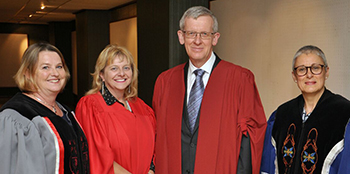Inaugural lecture explores the compatibility of commercial certainty and constitutionalism

From the left: Prof Caroline Nicholson,
Prof Elizabeth Snyman van Deventer,
Justice Malcolm Wallis and Dr Lis Lange. |
Justice Malcolm Wallis presented his inaugural lecture, entitled “Compatibility of commercial certainty and constitutionalism”, to the Faculty of Law on 17 September, 2015. The occasion was attended by faculty staff, students, and senior members of the Bloemfontein judiciary.
In her welcoming remarks, Prof Caroline Nicholson, Dean of the Faculty of Law at the UFS, expressed the immense pride the faculty has in hosting such an occasion, and the remarkable work of Justice Wallis in the South African legal fraternity over his forty-year career.
Justice Wallis spoke of the constitution’s important role in ensuring that the law in commercial matters is enforced fairly without the prejudice or undue influence from the desire to obtain or preserve personal advantage. “Try, if you can, to conceive of a society in which commercial relationships are enforced and enforceable purely as a matter of discretion. Ask yourselves: how would such a society function?” he said.
He reiterated that the role and the rule of law is to guide and protect parties in commercial transactions. It has considerable impact on society in how it is enforced. “Commercial disputes may seem to involve only the parties to the proceedings, but when they involve significant changes to established commercial law, their impact is inevitably wider. Such changes affect other agreements, other relationships, underlying financing transactions, and, in our modern world, contracts of insurance and reinsurance. The latter at least will always have an international dimension,” he said.
He explored specific judgements and the role the concept of “Ubuntu” played in delivering them, the fair enforcement of commercial law, and how this should be an integral part of South African law under the constitution.
In closing, Justice Wallis stated that “in principle, the existence of a constitution and constitutional rights need not destabilise commercial law, or the reasonable expectations of business people.”
Justice Wallis has received numerous accolades locally and internationally during his long career, including his appointment as a Professor Extraordinary in the Department of Mercantile Law at the University of the Free State in 2014.